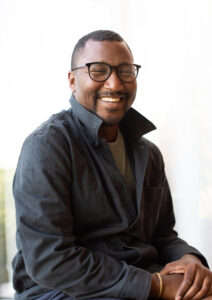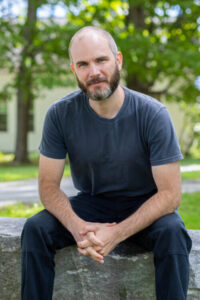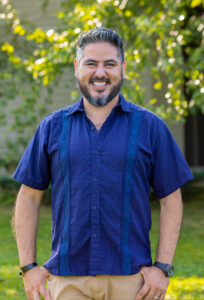
Tuesday July 1, 9 a.m. ET
Join us for an informational webinar about our academic program and how our approach to education impacts all aspects of life at Putney.

Tuesday July 1, 9 a.m. ET
Join us for an informational webinar about our academic program and how our approach to education impacts all aspects of life at Putney.
Putney is featured in the most recent issue of Town & Country magazine, in an article about the future of progressive education.
The article, “Can Private ‘Alternative’ School sSurvive in the Age of Cutthroat College Admission, features comments from Reid Hoffman ’85, co-founder of LinkedIn. he credits Putney with inspiring his first book, The Start-Up of You: Adapt, Take Risks, Grow Your Network, and Transform Your Career.
“Some of the central lessons of the book, many of which I learned at Putney, include being a lifelong learner and constantly adapting to your surroundings,” he said.
 Written by History Teacher and History Department Chair Pat O’Connor, his newly published book, The Political Reconstruction of American Tobacco, 1862-1933, explores how the federal government influenced the tobacco industry following the Civil War.
Written by History Teacher and History Department Chair Pat O’Connor, his newly published book, The Political Reconstruction of American Tobacco, 1862-1933, explores how the federal government influenced the tobacco industry following the Civil War.
“It explains how the tobacco industry — a pillar of American political economy since the early colonial period — was utterly transformed in the decades after the Civil War,” O’Connor said. “Broadly speaking, I am interested in how law and politics shape markets and the costs for those who lack the political power to participate in that process.”

The “deeply researched and clearly argued account,” digs into everything from labor to consumption; manufacturing to regulation, and demonstrates how tobacco emerged as a new industry that created immense power and stifling poverty across the nation, according to the description.
As a teacher, O’Connor often stresses to his students that they themselves are historians.
“They should know how to generate analytical questions about any information they encounter,” he said. “They should know how to find sources that can help them learn how to answer their questions, and then they need to know how to read and interpret those sources and put them into context to understand why they’re important. That’s what historians do professionally, and that’s what our classrooms are intended to help students learn.”
Throughout his book, there’s no question that O’Connor puts his teaching philosophy into practice.
“My book shows that the American tobacco market changed so much after the Civil War because of politics: manufacturers formed trade associations to shape federal tax policy (and ended up playing a crucial role in the construction of the Bureau of Internal Revenue —now known as the Internal Revenue Service); fertilizer producers and warehouse operators coordinated their efforts to determine international definitions of tobacco’s quality; and crop scientists promoted US tobacco production,” he said. “The tobacco market these people created overlooked, and even dismissed, the interests of tobacco growers, especially newly emancipated Black farmers and impoverished white farmers throughout the South. Like many markets, the tobacco market came to seem natural, but it was not. It was a political creation that rationalized debt, poverty, and intensified labor for thousands of small farmers.”
The Political Reconstruction of American Tobacco, 1862-1933 was published by Fordham University Press. A copy is available at the Putney library.
 Spanish Teacher and Language Department Chair Abelardo Almazán-Vázquez received a 2025 Distinguished Teacher Award from the Vermont Foreign Language Association. Part of the Vermont Organization of Classics and Language Educators (VOCALE), each year the organization honors an outstanding World Language teacher in the state.
Spanish Teacher and Language Department Chair Abelardo Almazán-Vázquez received a 2025 Distinguished Teacher Award from the Vermont Foreign Language Association. Part of the Vermont Organization of Classics and Language Educators (VOCALE), each year the organization honors an outstanding World Language teacher in the state.
“Although one of my school’s fundamental beliefs is ‘to work not for badges and honors,’ I am sincerely grateful,” Almazán-Vázquez said. “This achievement in my teaching career presents an opportunity to continue connecting, collaborating, and learning alongside inspiring educators. I hope to continue lending a hand to the community at large and not just teaching in an “ivory tower.”
The organization looks for those who are innovative, creative, and reflective in their practice, strive for professional growth, inspire and encourage students to become active global citizens, share expertise with colleagues, and exceed professional expectations.
“In addition to his dedicated work in the classroom, where students learn Spanish language and hispanohablante culture in a variety of authentic ways, Abelardo also serves his school as a soccer coach and dorm parent, among other titles,” VOCALE said in a press release. “His colleagues state that ‘students are centered and seen in Abelardo’s classroom,’ and ‘people talk about identity and work-life balance, but Abelardo is a teacher to the bone.’
“His work on the school’s Diversity, Equity, Inclusion, and Belonging Committee demonstrates his commitment to his school’s student body and community as a whole. It is an honor to present Abelardo with the Distinguished Teacher of the Year Award, and we at VOCALE congratulate him on his deep and meaningful work.”
This schedule is being finalized. Keep an eye on it for additions and slight revisions.
Return to the reunion website.
| 2:30–8:30 PM | Registration in Currier Center lobby |
| 2:30–4:00 PM | School store open in Old Boys dorm post office |
| 3:30 PM | Putney Mountain walk. Meet in main parking lot. |
| 4:30 PM | Afternoon barn chores (not mandatory) |
| 5:15 PM | Class of 1975 welcome back reception in KDU Faculty Room |
| 5:30 PM | Happy hour near KDU (location weather dependent) |
| 6:30 PM | Dinner for all classes |
| 8:30 PM | Sing in Barnes Assembly Hall |
| After dinner | Bonfires outdoors, weather permitting |
| Ongoing | Archives viewing and gathering space in Currier Center Gallery |
| Ongoing | Archives viewing and gathering space in Currier Center Gallery |
| 5:45 AM | Morning barn chores (not mandatory) |
| 7:00–7:30 AM | Coffee and pastries in KDU |
| 7:15 AM | Bird walk with ornithology teacher Todd Dowling. Meet lower level of Reynolds Building. School will provide binoculars. Listen and hopefully see some of the resident species on campus. Lower Farm and then up through the pasture. Be prepared with shoes and clothes that can handle some insects and a walk through the pasture. |
| 7:30–8:30 | Hot breakfast in KDU. (Continental breakfast available until 9:30) |
| 9 AM–5 PM | Registration in Currier Center lobby |
| 9 AM | State of the School assembly with Danny O’Brien and board of trustees in Barnes Assembly Hall. |
| 10:20 AM | Supervised kids’ play time. Drop your kids with Putney students and enjoy your morning sessions. Please sign up at registration table so we know how many kids to expect. Meet at registration table! |
| 10:30 AM | Morning sessions (Details below. This list may grow) |
| * Open studio time in fiber arts studio with Melissa Johnson ’77 | |
| * Genderless Latin Dance with Abelardo Almázan-Vázquez in dance studio in Currier Center | |
| * “Empty Bowls” ceramics workshop with Naomi Lindenfeld in ceramics studio | |
| * Putney Mountain hike. Meet in main parking lot. | |
| * Madrigals singing with Jenna Rae. Meet in Currier Center music room. | |
| 12–1 PM | Lunch in KDU and under tent |
| 12:30–3:30 PM | School store open in Old Boys dorm post office |
| 1:00 PM | Class of 1975 class photo on East Lawn |
| 1:30 PM | Common reading discussion led by Lydia Davis ’65. On Tyranny by Timothy Snyder |
| 2:30 PM | Class of 1975 class outing |
| 2:30 PM | Class photos, followed by class meetings (see below for photo times) |
| 3:30 PM | Campus tour. Meet outside of Main Building. |
| 4:30 PM | Afternoon barn chores (not mandatory) |
| 4:30 PM | Afternoon sessions |
| * Student Life conversation with Dean of Students Tarah Greenidge in Library classroom 1 | |
| * DEIJB: Staying the Course, a conversation with Dean of DEIJB Ann-Marie White in Calder Hall | |
| * Drop-in conversations with Putney trustees in Main Building Classroom | |
| 5:30 PM | Happy Hour outside of KDU |
| 5:45 PM | Putney Generations photo outside of KDU. Parents/children who both attended Putney please join. |
| 6:30 PM | Dinner |
| After dinner | Bonfires outdoors, weather permitting |
| 8:30–9:45 PM | Contra/square dance in Barnes Assembly Hall |
| East Lawn | Outside KDU |
| 1:00 PM: Class of 1975 | 2:30 PM: Classes of 1990–91 |
| 2:30 PM: Classes of 1965–66 (followed by class Zoom call in KDU Faculty Room) | 2:45 PM: Classes of 2008–10 |
| 2:45 PM: Classes of 1970–71 | 3:00 PM: Classes of 1950 and 1955 |
| 3 PM: Classes 1999–02 | 5:45 PM: Putney generations photo. Parents/children who both attended Putney please join |
| 5:45 AM | Morning barn chores (not mandatory) |
| 8–9 AM | Continental breakfast in KDU |
| 9 AM–12 PM | Full brunch in KDU |
 Michael Abrams is an artist and painter of nature who has exhibited his works around the United States and abroad. He grew up in Rensselaer County in a home perched above the majestic greenery of the Hudson Valley. These views became deeply engrained in his subconscious and profoundly influenced the way he sees the world.
Michael Abrams is an artist and painter of nature who has exhibited his works around the United States and abroad. He grew up in Rensselaer County in a home perched above the majestic greenery of the Hudson Valley. These views became deeply engrained in his subconscious and profoundly influenced the way he sees the world.
Combining a love of art history and images collected from memory and nature, Abrams work offers a glance at personal observations summoning far off scenes, diffused tree forms, and glints of light reflecting off distant waters, all suggesting a selection of familiar fragments of nature meant to recall memory and emotion and instill longing for an idyllic world.
One of the strongest influences on Abrams practice has been the painters of the Romantic Period in Europe and then in America with the Hudson River School. These artists exemplified this era’s concept of the sublime in nature and art, robustly, and with an element of theater, extolled the virtues of nature as man’s spiritual cathedral. Their ability to capture the breadth and scale of the natural world exemplified an Arcadian ideal.
Since his move to Vermont in 2008 from lower Manhattan, Abrams has embraced the local natural environment as an increasingly direct influence on his work. Daily observations in the Green Mountains have altered his perception and appreciation of our environment, it’s fragility and our place in it. Humbled by the abundantly varied vistas and their never-ending seasonal rebirth, the striking physical character of the landscape, the unique qualities of light, and atmosphere oscillating between crystal clear to thickly obscuring, these elements have become key in the story he is telling of his relationship with nature.
The paintings are rendered with a layering of oil glazes mixed with color from semi- transparent to opaque creating an atmospheric and luminous quality.
He has lived and worked in lower Manhattan for thirty plus years and now enjoys life in his studio in the Green Mountains of southern Vermont.

